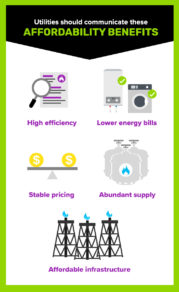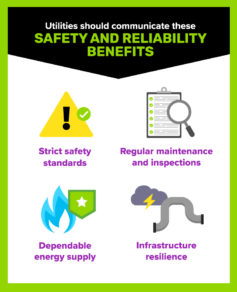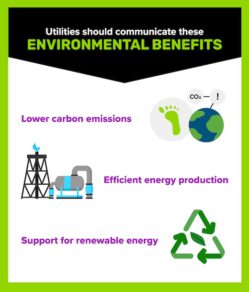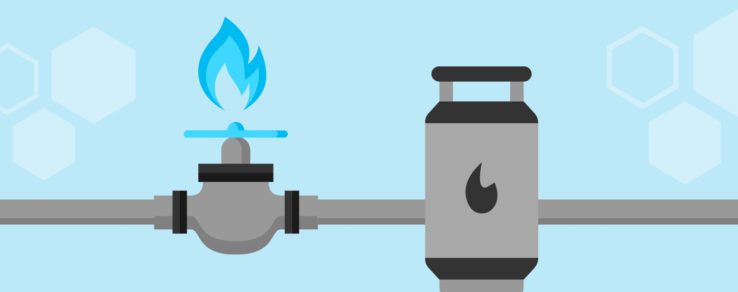Today’s utility customers are increasingly concerned about energy reliability, cost efficiency and their environmental impact. Many consumers want to know, what are the benefits of natural gas compared to other energy options? With the wide variety of options available, utilities need to prioritize communicating about the key advantages of natural gas.
What Customers Want to Know
To effectively communicate the benefits of natural gas, utilities must first understand the specific needs, preferences and concerns that customers may have.
When it comes to energy, customers are mainly concerned about:
- Affordability
- Reliability and safety
- Environmental impact

By educating customers on the environmental, economic and reliability benefits of natural gas, utilities can foster a more informed customer base and position themselves as valuable partners in an ever-changing energy landscape.
“Our communications center around the message that natural gas is safe, comfortable, affordable, reliable and environmentally responsible,” says Jason Wheatley, Lead Communications Manager at Piedmont Natural Gas. “We’re committed to helping our customers learn ways they can save energy and money in their homes and businesses by using natural gas and using it more efficiently.”
The Communications team at Piedmont Natural Gas regularly listens to customer panels and focus groups to better understand where communications are hitting the target and where they may need to shift strategies. “Our customers will always be our best source of information on how we can evolve, so it’s vital that we listen to them and meet them when and where we can,” Wheatley explains.
Benefits of Natural Gas: Affordability
For residential and commercial customers alike, the cost of energy is a significant consideration. They want to know if natural gas is more cost-effective than other energy sources. In today’s economy, consumers are looking for easy ways to save money and reduce monthly expenses.
Utilities should provide transparent information on how natural gas can lower energy costs for a home or business. For example, the efficiency of natural gas appliances and heating systems can lead to long-term savings for homeowners. In addition to highlighting the benefits of natural gas, utilities should regularly promote rebates and incentives for customers who install energy-efficient natural gas appliances.
According to the American Public Gas Association (APGA), families that use natural gas for heating, cooking and clothes drying save more than $1,132 a year on average compared to all-electric homes. Additionally, investments to develop and enhance natural gas infrastructure generate well-paying jobs and stimulate local economies.
Utilities should communicate these affordability benefits:
- Lower energy bills: Natural gas typically costs less than other energy options, translating to lower monthly bills for heating, cooking and hot water.
- High efficiency: Natural gas appliances, such as furnaces, water heaters and dryers, are highly efficient.
- Stable pricing: Natural gas prices have remained relatively stable compared to other energy sources, providing predictable energy costs.
- Abundant supply: The abundant supply of natural gas in many regions contributes to consistent and competitive pricing.
- Affordable infrastructure: The infrastructure for natural gas delivery is well-established. It is often less expensive to maintain and expand compared to other energy delivery systems.

“Natural gas is valuable to consumers for its affordability, efficiency and reliability,” says Audrey Casey, Communications & Marketing Director at the American Public Gas Association (APGA). “As an energy source that is over three times more affordable than grid-delivered electricity, natural gas is a cost-effective option for many homes and businesses, especially in low- and middle-income communities.”
Benefits of Natural Gas: Reliability and Safety
For utility marketers, emphasizing natural gas’s reliability and safety benefits is crucial in building customer trust and confidence.
When communicating the benefits of using natural gas, utilities should highlight the ongoing investments in infrastructure that ensure a reliable and safe supply. For example, messaging could focus on safety protocols or regular maintenance practices.
Utilities should also incorporate customer education about natural gas safety into their communications strategy. Public awareness campaigns ensure customers know what to do in the event of a suspected gas leak.
Utilities should communicate these safety and reliability benefits:
- Strict safety standards: Natural gas utilities adhere to rigorous federal, state and local safety regulations designed to protect both customers and infrastructure.
- Regular maintenance and inspections: Natural gas utilities conduct regular maintenance and inspections of pipelines and equipment to prevent leaks.
- Dependable energy supply: Natural gas provides a reliable energy supply unaffected by weather conditions that can disrupt electricity generation.
- Infrastructure resilience: Natural gas infrastructure is designed for durability and resilience, with pipelines buried underground to protect them from extreme weather.

According to Nick Paradise, Communications Manager at Peoples Natural Gas, the utility revisited its core communications priorities earlier this year. The Communications team determined that safety, reliability, sustainability and community were the top pillars they wanted to come to mind when customers think of Peoples Natural Gas. These benefits of natural gas are consistent throughout the utility’s marketing messages.
“We communicate about these four areas of focus through all available channels – paid advertising, earned media, our owned channels like our website and customer e-Accounts,” Paradise says. “These pillars play an important role for our marketing and communications teams in developing personal relationships with key stakeholders and having a visible presence at trade shows and similar events.”
Benefits of Natural Gas: Environmental Impact
In an era where environmental consciousness is increasingly driving consumer choices, utilities must communicate the environmental benefits of natural gas.
Communicating the environmental benefits is not just a marketing strategy—it’s a critical component of building customer trust, supporting sustainability and positioning natural gas as a key component in the transition to a cleaner energy future.
According to the U.S. Energy Information Administration, natural gas utilities have reduced emissions by 70% over the past 30 years. Additionally, due to weatherization, energy-efficiency programs and the inherent efficiency of natural gas, the average emissions from homes using this energy source have dropped by half, based on APGA data.
“Natural gas is a critical energy source that plays an important role in meeting local and federal environmental goals,” Casey says. “The direct use of natural gas in homes and businesses reduces the demand for other, more carbon-intensive forms of energy, resulting in net carbon emission reductions.”
Utilities should communicate these environmental benefits:
- Lower carbon emissions: Natural gas produces significantly fewer carbon dioxide emissions than coal and oil when burned for energy.
- Efficient energy production: Natural gas power plants are highly efficient, converting a larger portion of the fuel into usable energy compared to other fossil fuels.
- Support for renewable energy: Natural gas is a reliable partner for renewable energy sources like wind and solar. It provides a backup when renewable energy production is low, ensuring a stable and continuous energy supply.

Piedmont Natural Gas and its parent company, Duke Energy, are working toward climate goals of net-zero methane by 2030 and net-zero carbon by 2050. To accomplish these goals, the utility is investing in renewable energy sources, including renewable natural gas (RNG). To inform and educate customers, Piedmont shares transparent information about these initiatives and the environmental benefits of using natural gas.
“We take these goals very seriously, so the lower emissions created through the direct use of natural gas is something we promote regularly,” Wheatley says. “We’re also sharing more information about RNG as we invest in more projects, and we continue to add it to our natural gas supply.”
Through the GreenEdge program, Piedmont Natural Gas provides customers with the opportunity to support renewable energy and reduce their carbon footprint. Both residential and small commercial customers can subscribe to monthly “blocks” representing RNG environmental attributes and carbon offsets.
According to Wheatley, carbon offsets are derived from projects like forestry management and wetland reclamation that reduce or prevent the release of greenhouse gases. Renewable natural gas environmental attributes are generated from various sources, including wastewater, landfills, agricultural waste or food waste.
Since 2022, GreenEdge program participants have contributed to the purchase of 3,729 tons worth of carbon offsets and 668 tons of RNG attributes. These customers have helped support four projects dedicated to reducing and offsetting carbon emissions.
“The growth of Piedmont’s GreenEdge program allows us to speak more about the environmental benefits of natural gas and how our customers can offset any emissions from their own usage,” Wheatley says.
Building a more informed customer base
Natural gas utilities are facing a challenging landscape, but they are adapting to meet the evolving needs and expectations of their customers. By effectively communicating the benefits of natural gas and addressing customer concerns, utilities can build trust, enhance engagement and continue to play a vital role in a sustainable energy future.
“We are responsive to the evolving needs of energy consumers, and our communication strategy reflects this,” Casey says. “We will continue to monitor the media and policy landscape as we collaborate with our members and external partners to educate Americans about the critical role that natural gas plays in our energy future.”

